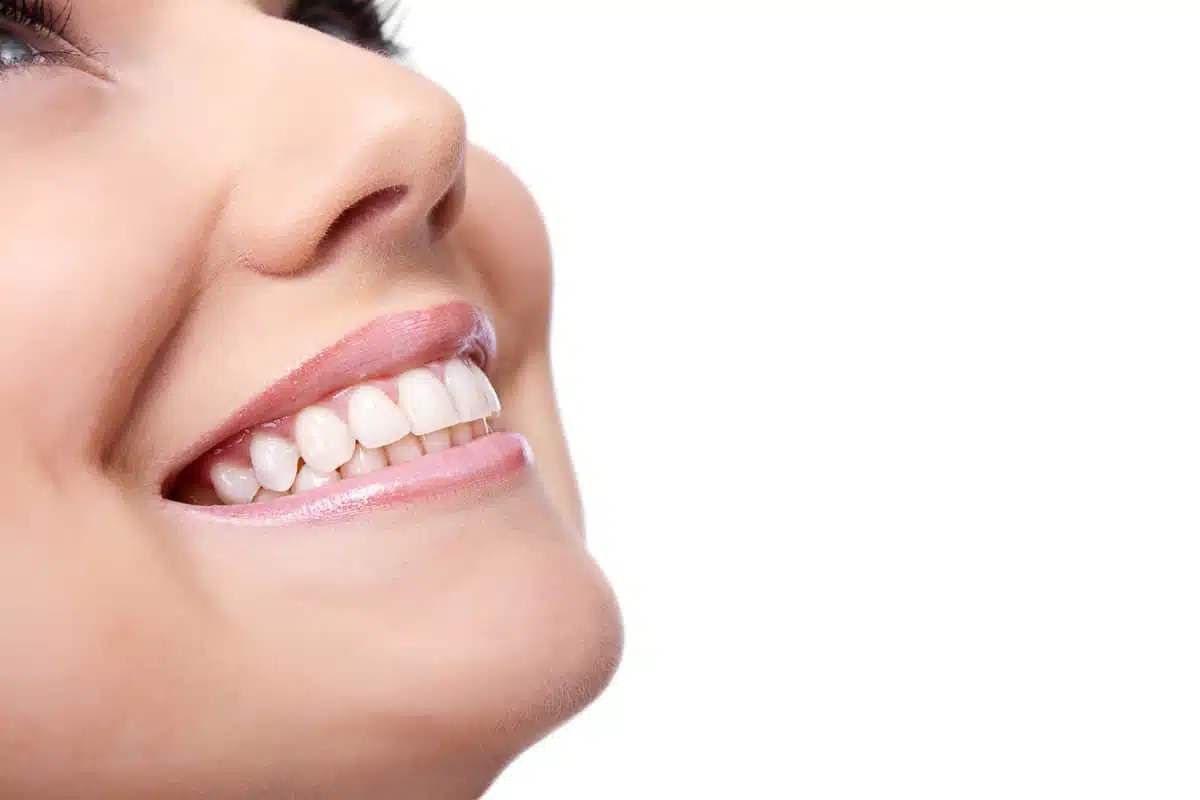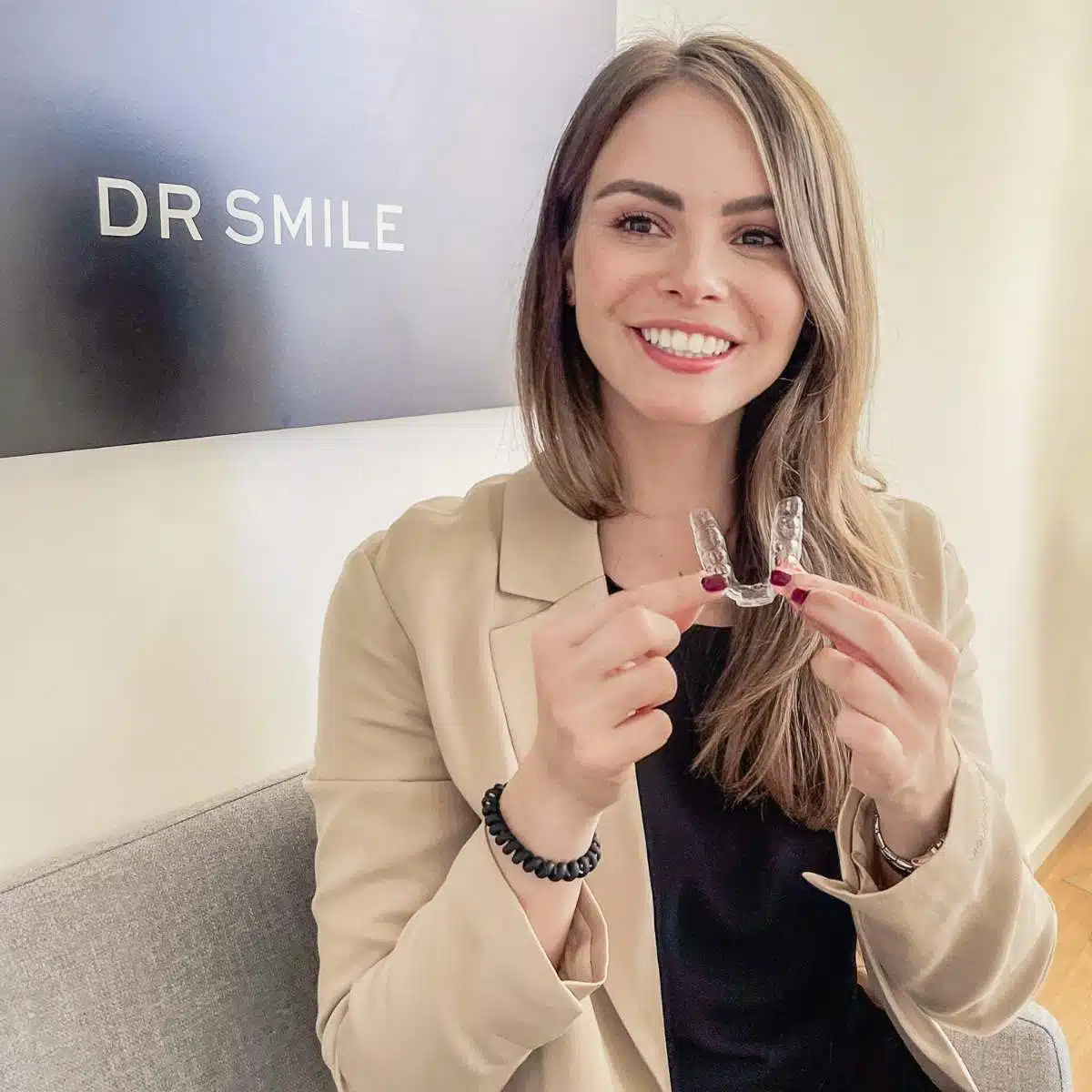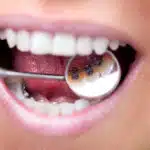Adult dentition: How many teeth does an adult have? You can find the answer to this question and much more information in this article.
In this article, we take you on an exciting journey into the world of oral health and answer a seemingly simple, yet essential question: “How many teeth does an adult actually have?”
The topic of “adult dentition” may seem trivial at first glance, but a deeper look reveals the complexity and importance of our teeth.
| Get 150 € discount on your dental correction! |

Book a consultation appointment now at a nearby DrSmile partner practice and find out if teeth straightening with aligners is right for you.
The appointment is completely non-binding and does not involve any costs.
With the code “THATSMILE150” you will receive 150 € discount on the treatment.
In this blog post, we therefore explore not only the number of teeth an adult normally has, but also their functions, types and the importance of dental care.
You will also find out why every single tooth in our mouth plays a key role in our health and well-being.

Adult dentition: How many teeth do adults actually have?
Have you ever wondered how many teeth an adult human has and what functions they fulfill?
This seemingly simple topic is actually key to our overall well-being and health.
How many teeth does an adult actually have?
A complete set of adult teeth normally comprises 32 teeth. This number is made up of:
- 8 incisors: Four at the top and four at the bottom, which are used to cut food.
- 4 canine teeth: These pointed teeth help to tear food.
- 8 premolars: These are located behind the canines and are responsible for grinding food.
- 12 molars: Including the wisdom teeth, which are used to crush and grind food.
What are the functions of the different types of teeth?
The different types of teeth also fulfill different functions, which we will discuss in more detail here:
1st incisors
Incisors are located in the front part of the human dentition. There are a total of eight incisors in an adult’s mouth, four in the upper jaw and four in the lower jaw.
They are located directly behind the lips and are the first teeth you see when you smile or speak.
Incisors have specific characteristics and functions:
- Shape and appearance: Incisors typically have a flat, shovel-like shape with a sharp edge. Their shape is ideal for biting off food. They normally only have one root.
- Function: As the name suggests, incisors are mainly designed to bite off and cut food. They are not designed for chewing or grinding food, but for separating bites of softer foods such as fruit or vegetables.
- Development: Incisors are some of the first teeth to appear in the primary dentition (baby teeth), usually between the sixth and eighth month of life. The permanent incisors replace the milk teeth later in childhood, usually between the ages of six and eight.
- Importance for appearance: Incisors play an essential role in the aesthetics of the smile. Their size, shape and color contribute significantly to the appearance of the smile.

2. canines
Canines are special types of teeth in the human dentition that play an important role in both the functionality and esthetics of the mouth.
An adult human has a total of four canines, two in the upper jaw and two in the lower jaw.
They are located on the side of the teeth, directly next to the incisors. In the upper jaw they are the third teeth seen from the center, in the lower jaw they are the third teeth seen from the center.
Canines have specific characteristics and functions:
- Special features: Canines are characterized by their unique shape. They have a pointed and slightly curved surface, which distinguishes them from other types of teeth. Canines are often longer and stronger than other teeth and have a single but strong root.
- Function: The main function of the canines is to grasp and tear food, especially harder or fibrous foods. Their pointed shape and firm anchoring in the jaw make them ideal for this task. Canines also help to support the incisors when biting and play an important role in maintaining the correct alignment of the rows of teeth.
- Development: Like other permanent teeth, the canines first develop as milk teeth in early childhood and are later replaced by the permanent canines. This usually happens between the ages of nine and twelve.
- Esthetic significance: Canines contribute significantly to the appearance of the smile. They form a smooth transition between the front incisors and the back molars. Their health and position influence the overall appearance of the dentition.
| Get 150 € discount on your dental correction! |

Book a consultation appointment now at a nearby DrSmile partner practice and find out if teeth straightening with aligners is right for you.
The appointment is completely non-binding and does not involve any costs.
With the code “THATSMILE150” you will receive 150 € discount on the treatment.
3. premolars and molars (molars)
Premolars and molars are two types of molars in the human dentition, each of which fulfills specific functions in food intake.
Both premolars and molars are crucial for efficient food intake and digestion.
Here is a detailed explanation of both:
Premolars (also known as premolars)
- Position and number: There are eight premolars in the adult dentition – two on each side in both the upper and lower jaw. They are located between the canines and molars.
- Form and function: Premolars have a flatter chewing surface than molars and are often slightly smaller. Their main function is to grind and prepare food so that it can be further ground by the molars. Premolars usually have two cusps on the occlusal surface.
- Development: Premolars first develop as part of the primary dentition and are then replaced by permanent premolars during late childhood.
Molars (also known as molars)
- Position and number: Adults normally have twelve molars – three on each side of the upper and lower jaw. This also includes the wisdom teeth, the backmost teeth in the dentition.
- Form and function: Molars are larger than premolars and have a wider chewing surface with several cusps. They are designed to thoroughly grind and crush food, which is important for efficient digestion.
- Development: The first molars usually appear in early childhood, the second molars in late childhood and the wisdom teeth usually in early adulthood, although in some people they do not appear at all or appear later.
Why good dental care is so important for adults’ teeth
The health of our teeth and gums has far-reaching effects on our entire body.
Poor oral hygiene can lead to tooth decay, gum disease and, in the worst case, tooth loss.
But it’s not just about our teeth; problems in the mouth can also exacerbate other health problems such as heart disease and diabetes.
The basics of dental care
- Brush your teeth regularly: Brush your teeth at least twice a day, preferably after every meal, to remove plaque and bacteria. Use a soft toothbrush and fluoride toothpaste.
- Use dental floss: Daily flossing helps remove plaque and food debris that your toothbrush can’t reach.
- Regular visits to the dentist: Visit your dentist at least twice a year for a professional cleaning and examination. This is crucial for the early detection and treatment of problems.
- Pay attention to your diet: A dental-healthy diet rich in vitamins and minerals and avoiding sugary snacks and drinks supports oral health.
- Use mouthwash: Mouthwash can provide additional protection against tooth decay and gum disease.
| Get 150 € discount on your dental correction! |

Book a consultation appointment now at a nearby DrSmile partner practice and find out if teeth straightening with aligners is right for you.
The appointment is completely non-binding and does not involve any costs.
With the code “THATSMILE150” you will receive 150 € discount on the treatment.
Further tips for effective dental care
- Change your toothbrush regularly, about every three months. This also applies to the brush heads of electric toothbrushes.
- Avoid tobacco products, which can severely affect your oral health.
- Drink plenty of water, especially after meals, to flush away food debris and bacteria.
Crooked teeth can also have a negative impact on our health
In addition to poor dental care, there is another stumbling block for our (dental) health: namely crooked teeth.
Misaligned teeth are not just an aesthetic problem; they can also have far-reaching consequences for our health.
Health effects of misaligned teeth
- Increased risk of tooth decay and gum disease: Crooked teeth can be harder to clean, leading to a buildup of plaque and bacteria. This increases the risk of tooth decay and gum disease.
- Tooth wear: Irregular tooth positions can lead to uneven loading when chewing, which wears down the teeth excessively.
- Jaw problems and TMD (temporomandibular dysfunction): Misalignment can lead to uneven loading of the temporomandibular joint, which can cause pain and dysfunction.
- Speech problems: In some cases, misaligned teeth can affect pronunciation and lead to speech problems.
- Self-esteem and mental health: Aesthetic concerns about crooked teeth can affect self-esteem and cause psychological stress.

Correction of misaligned teeth with invisible aligners
Invisible aligners offer an effective and discreet solution for correcting misaligned teeth.
These modern orthodontic appliances are virtually invisible and offer more comfort and flexibility than traditional braces.
Invisible aligners are custom-made, clear plastic trays that fit over the teeth. You apply gentle pressure to gradually move the teeth into the desired position.
Advantages of invisible aligners
- Aesthetics: They are almost invisible, making them a popular choice for adults who want an inconspicuous treatment.
- Comfort: They are removable, which makes eating and cleaning teeth easier. The treatment is also painless.
- Health: By correcting misaligned teeth, they help to improve oral health.
Our recommendation for your discreet tooth correction is DrSmile.
Here you will find lots of authentic testimonials, the price structure is transparent and the company can look back on over 150,000 successfully completed tooth corrections.
In addition to the good price-performance ratio, the company also offers a satisfaction guarantee if you are not one hundred percent happy with the result.
| Get 150 € discount on your dental correction! |

Book a consultation appointment now at a nearby DrSmile partner practice and find out if teeth straightening with aligners is right for you.
The appointment is completely non-binding and does not involve any costs.
With the code “THATSMILE150” you will receive 150 € discount on the treatment.
FAQs on the topic“Adult dentition: How many teeth does an adult have?“
Here we answer a few of the most frequently asked questions on the subject of “Adult dentition: How many teeth does an adult have?”.
How many teeth does an adult normally have?
A complete set of adult teeth consists of 32 teeth, including the wisdom teeth.
What are wisdom teeth and why are they often removed?
Wisdom teeth are the rearmost molars that often erupt in early adulthood. They are removed if they cause pain, are too tight or cannot break through properly.
How often should I go to the dentist?
It is recommended that you visit the dentist at least twice a year to maintain your oral health and detect problems at an early stage.
What is tartar and how can it be prevented?
Tartar is hardened plaque that forms on the teeth. Regular brushing, flossing and professional dental cleanings can prevent it.
Can adults still wear braces?
Yes, adults can wear braces. There are even discreet options such as invisible aligners, which are especially popular for adults.
What causes bleeding gums and how can it be treated?
Bleeding gums can be a sign of gingivitis. Good oral hygiene and regular dental check-ups are important for treatment.
How does smoking affect adult dentition?
Smoking can lead to tooth discoloration, gum disease and an increased risk of oral cancer.
What is the best way to keep teeth naturally white?
Avoid foods and drinks that cause discoloration and practice thorough oral hygiene. Teeth whitening can also be done professionally by a dentist.
Why are regular professional dental cleanings important?
Professional dental cleanings remove plaque and tartar more effectively than normal tooth brushing and help to prevent gum disease.
Can poor oral health cause other health problems?
Yes, there are links between oral health and other health problems such as heart disease and diabetes.



Leave a Reply